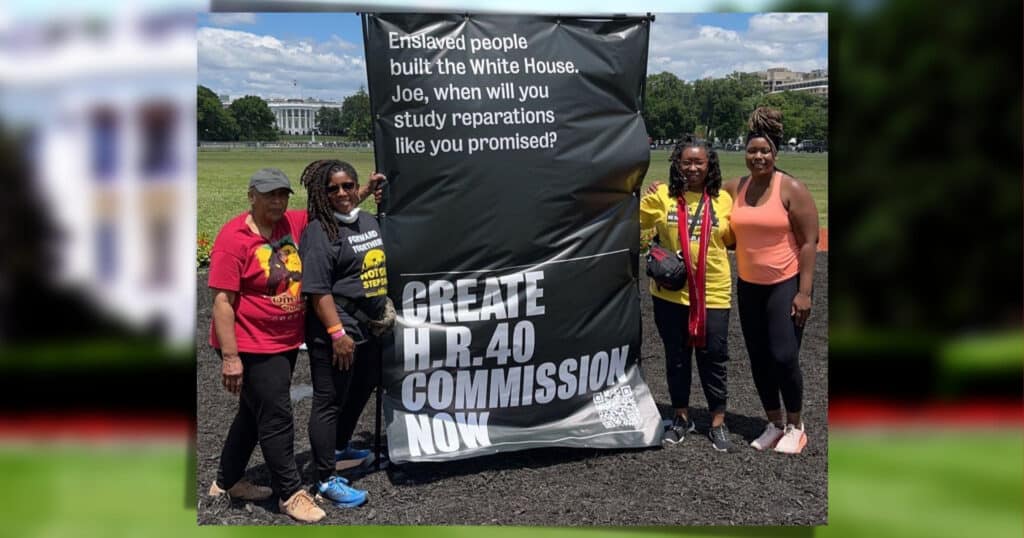Economic justice minister: It’s time for real action on reparations
36 But I tell you that everyone will have to give account on the day of judgment for every empty word they have spoken. 37 For by your words you will be acquitted, and by your words you will be condemned.
— Matthew 12:36-37, NIV
On Aug. 23, we honor the International Day for the Remembrance of the Slave Trade and its Abolition. UNESCO — the United Nations Educational, Scientific and Cultural Organization – has designated this date to memorialize the transatlantic slave trade. It has been observed globally since 1998.
It marks the night of Aug. 22-23, 1791, and the beginning of an uprising in Haiti that played a key role in the abolition of the transatlantic slave trade.
This year, as part of this international observance, it’s time to:
- Press Congress and the Biden administration to act on reparations,
- Fight reactionary efforts to undo good reparations proposals, and
- Congratulate those who are working locally to close the historic wealth gap between white and Black Americans.
The United Church of Christ and the Why We Can’t Wait Coalition are among those pressing for enactment of H.R. 40, the “Commission to Study and Develop Reparation Proposals for African Americans Act” – either by act of Congress or by executive order. The Why We Can’t Wait Coalition has released a statement due to the lack of response from the White House to our request to establish a study commission by executive order. After meetings of faith and secular organizations with the White House, educational webinars and advocacy on H.R. 40, the Coalition sent a follow-up letter to President Biden urging such an executive order. It was not acknowledged.
Unfortunately, at the same time, an informal smoke-and-mirrors campaign to slow and divide the Reparatory Justice Movement continues to grow in the United States. It is rooted in American exceptionalism, miseducation and divisiveness. Congresspersons have sought and passed in the House of Representatives a “symbolic” measure to designate Aug. 20 as a national day to remember slavery and its abolition – despite the fact that an international day for that purpose has existed for more than 20 years. It is time to clearly connect the reparations movement in the U.S. with the global reparations movement for people of African descent. It is essential to hold the collective narratives and experiences of African-descendant people together globally. Anything less is a distraction that fails to recognize our involvement in the transatlantic slave trade and gives a veneer of movement to repair.
In addition, it gives fuel to the divisive American Descendants of Slavery (ADOS) and Freedman campaigns that have promoted strict lineage-based reparations. These campaigns do not recognize that the repair sought by African Americans is for slavery and racist systems and institutions. The latter continue to result in disparate outcomes for Blacks globally, related to the racial wealth gap, maternal health, lending, education and educational debt, farming and ecological devastation, among other things. Statistics on those – and on voting rights, police brutality and more – do not differ based on whether one’s great, great, great, great grandparents were enslaved in what is now the U.S. or what is now Haiti. All those descendants are here and have suffered the effects of Jim Crow and predatory lending. All share in the same despair of having $23,000 in wealth compared to $184,000 in wealth for non-Hispanic White families.
I am thankful for ministries like one at Arlington Community Church, UCC, in Kensington, Calif. That congregation joined with the Richmond Community Foundation to create a Black Wealth Builders Fund. It helps Black families to close the wealth gap by assisting with down payments for mortgages. Home ownership remains one of the key ways a family can gain wealth. Arlington UCC and its Black Wealth Builders Fund started accepting applications late this spring. They require no stringent proof of lineage. Instead, they offer a faithful commitment to accountability and repair.

The Rev. Sekinah Hamlin is minister for economic justice with the UCC’s Justice and Local Church Ministries.
Content on ucc.org is copyrighted by the National Setting of the United Church of Christ and may be only shared according to the guidelines outlined here.
Related News
A Moment of Silence
The weekend news was alarming. Two students shot and killed with 9 injured at Brown University...
Read MoreIn hope-filled worship service, UCC and United Church of Canada celebrate full communion past and future
On Saturday, Dec. 13, many from the United Church of Christ (UCC) and the United Church of...
Read More‘A Gift of God to the World:’ Christmas greetings from the General Minister and President
As Christmas quickly approaches, UCC General Minister and President/CEO the Rev. Karen Georgia...
Read More


